No edit summary Tag: sourceedit |
Aramithius (talk | contribs) (Detailing involvement in the Second Akaviri Invasion) Tags: Visual edit apiedit |
||
| Line 17: | Line 17: | ||
[[File:Heart of Lorkhan.png|thumb|The [[Heart of Lorkhan]].]]With the Dunmer and the Dwemer [[War of the First Council|fighting among themselves]] in the First Era, the Nords either saw an opportunity to regain their old dominions and invaded,<ref name="Songs" /> or were invited to participate in the war by [[House Dagoth]] and the [[Dwemer]].<ref>''[[The Real Nerevar]]''</ref><ref>''[[The War of the First Council]]''</ref> The Tongues who led this war summoned Shor, who summoned Wulfharth to lead the Nords.<ref name="Songs" />[[File:Red Mountain.jpg|thumb|The [[Red Mountain]].]]Some sources claim that Wulfharth was involved in the Battle of Red Mountain and slew [[Dumac]], the leader of the Dwemer, before [[Vivec]] blasted Wulfharth to pieces.<ref name="Songs" /> Other sources imply this deed was done by the Dunmer warlord [[Nerevar]].<ref name=":1" /> |
[[File:Heart of Lorkhan.png|thumb|The [[Heart of Lorkhan]].]]With the Dunmer and the Dwemer [[War of the First Council|fighting among themselves]] in the First Era, the Nords either saw an opportunity to regain their old dominions and invaded,<ref name="Songs" /> or were invited to participate in the war by [[House Dagoth]] and the [[Dwemer]].<ref>''[[The Real Nerevar]]''</ref><ref>''[[The War of the First Council]]''</ref> The Tongues who led this war summoned Shor, who summoned Wulfharth to lead the Nords.<ref name="Songs" />[[File:Red Mountain.jpg|thumb|The [[Red Mountain]].]]Some sources claim that Wulfharth was involved in the Battle of Red Mountain and slew [[Dumac]], the leader of the Dwemer, before [[Vivec]] blasted Wulfharth to pieces.<ref name="Songs" /> Other sources imply this deed was done by the Dunmer warlord [[Nerevar]].<ref name=":1" /> |
||
| − | Yet another tale claims that the Nords and Wulfharth were at Red Mountain to reclaim the [[Heart of Lorkhan|Heart of Shor]]. This version of events say that Wulfharth made peace with the orcs, causing a large portion of his army to desert, and was slain by [[Alandro Sul]], who Wulfharth blinded with a shout.<ref name="Songs" /> |
+ | Yet another tale claims that the Nords and Wulfharth were at Red Mountain to reclaim the [[Heart of Lorkhan|Heart of Shor]]. This version of events say that Wulfharth made peace with the orcs, causing a large portion of his army to desert, and was slain by [[Alandro Sul]], who Wulfharth blinded with a shout.<ref name="Songs" /> Other sources claim he survived the Battle however, and was just displaced, being carried back to Skyrim.<ref name="Heresy2" /> |
| − | === |
+ | === Second Akaviri Invasion === |
| + | When the [[Kamal]] invade Skyrim in the 2E 572, Wulfharth is summoned again to aid the Ebonheart Pact, either by [[Almalexia]]<ref name="Heresy2" /> or [[Jorunn the Skald-King|Jorun the Skald-King]].<ref>''[[Jorunn the Skald-King]]''</ref> It was during this time that Wulfharth began to be called the Underking, and disassociated with the Nords in some way. Following the invasion, Wulfharth disappears again.<ref name="Heresy2" /> |
||
| − | [[File:Almalexia2.png|thumb|Goddess Almalexia of the Tribunal as seen in [[Elder Scrolls Online]].]]Wulfharth does not perish, however. The fact that he was Shor's avatar for all that time surely had something to do with it. In honor of his memory, the Nords added him to their religion's pantheon as [[Ysmir]] the Grey Wind, the Storm of Kyne. They weren't far from the truth as Wulfharth became a divine being. |
||
| + | ===Wars of Tiber Septim=== |
||
| − | + | [[File:High Hrothgar Exterior 1.jpg|thumb|278px|High Hrothgar.]]Three hundred years later, the rumbling of the Greybeards awakened him. Though the Empire had crumbled, there were rumours that a Chosen One would come to restore it. This new Emperor would defeat the Elves and rule a united [[Tamriel]]. His power and the destruction of his enemies in mind, Ysmir thought he was the chosen one of the prophecy. He went directly to [[High Hrothgar]] to hear the Greybeards speak. When they did, Wulfharth was blasted to ash for the third time. Their words said that he was not the chosen one, for it would be a warrior youth from High Rock. As the Grey Wind went to find this boy, he heard the Greybeards' final warning: remember the colour of betrayal, king Wulfharth.<ref name="Heresy">''[[The Arcturian Heresy]]''</ref> |
|
The Western Reach was at war. [[Cuhlecain]], the king of Falkreath in western Skyrim, once part of Cyrodiil for a very short time, was in a bad situation. To make any bid at unifying the [[Colovian Estates]], he needed to secure his northern border, where the Nords and Reachmen had been fighting for centuries. He allied with Skyrim at the Battle of Old Hrol'dan. Leading his forces was [[Hjalti Early-Beard]]. Hjalti was from the island kingdom of [[Alcaire]], in [[High Rock]], and Wulfharth discovered he would become the First Emperor of Tamriel.<ref name="Heresy" /> |
The Western Reach was at war. [[Cuhlecain]], the king of Falkreath in western Skyrim, once part of Cyrodiil for a very short time, was in a bad situation. To make any bid at unifying the [[Colovian Estates]], he needed to secure his northern border, where the Nords and Reachmen had been fighting for centuries. He allied with Skyrim at the Battle of Old Hrol'dan. Leading his forces was [[Hjalti Early-Beard]]. Hjalti was from the island kingdom of [[Alcaire]], in [[High Rock]], and Wulfharth discovered he would become the First Emperor of Tamriel.<ref name="Heresy" /> |
||
Revision as of 14:01, 15 March 2017
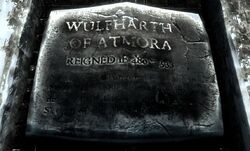
Wulfharth's Plaque in Windhelm.
Wulfharth, also known as Ysmir, Dragon of the North, Shor's Tongue, and the Breath of Kyne[1][2] was an ancient king of Skyrim. He is the subject of several Nordic myths and legends, and has become known as The Underking or The Ash King.[1][3]
Wulfharth was proficient at using the Thu'um, and his voice was so powerful that he could not verbally take the oath of allegiance required of him by the Pact of Chieftains.[1] During his reign, he drove the Direnni Hegemony from Skyrim.[4] He is said to have died and been resurrected multiple times throughout Tamrielic history.[1][3]
Mortal History
Wulfharth was born in Atmora in the First Era. He was chosen ruler of Skyrim in 1E 500 by the Pact of Chieftains after the death of High King Hoag Merkiller who was killed in the Battle of Glenumbra Moors.[5][2] This battle ended the War of Succession, which saw the Nords lose their holdings in High Rock and Morrowind.[6]
Religious Reform
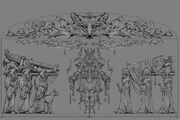
A depiction of Shor as seen in ancient Nordic ruins.
Wulfharth's first act was to continue the work of his predecessor in restoring the old Nordic faith, outlawing the Alessian Doctrines and reinstating the traditional Nordic Pantheon.[5] This was followed by persecution of the Alessian priests, many of whom were burnt at the stake.[2]
Military Deeds Against the Orcs
In addition to his involvement at the Battle of Glenumbra Moors, Wulfharth is recorded as having fought repeatedly against the Orcs, "shouted their Chieftain into Hell", and then fighting against them and Alduin, who turned the Nords into children. Wulfharth pleaded with Shor to come to their aid, and Shor fought Alduin and Wulfharth learned the thu'um of How to Shake the Dragon Just So. However, he shook too many years out of himself, and died.[2]
Resurrections
War of the First Council
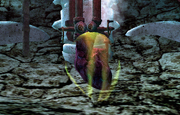
The Heart of Lorkhan.
With the Dunmer and the Dwemer fighting among themselves in the First Era, the Nords either saw an opportunity to regain their old dominions and invaded,[2] or were invited to participate in the war by House Dagoth and the Dwemer.[7][8] The Tongues who led this war summoned Shor, who summoned Wulfharth to lead the Nords.[2]

The Red Mountain.
Some sources claim that Wulfharth was involved in the Battle of Red Mountain and slew Dumac, the leader of the Dwemer, before Vivec blasted Wulfharth to pieces.[2] Other sources imply this deed was done by the Dunmer warlord Nerevar.[9]
Yet another tale claims that the Nords and Wulfharth were at Red Mountain to reclaim the Heart of Shor. This version of events say that Wulfharth made peace with the orcs, causing a large portion of his army to desert, and was slain by Alandro Sul, who Wulfharth blinded with a shout.[2] Other sources claim he survived the Battle however, and was just displaced, being carried back to Skyrim.[3]
Second Akaviri Invasion
When the Kamal invade Skyrim in the 2E 572, Wulfharth is summoned again to aid the Ebonheart Pact, either by Almalexia[3] or Jorun the Skald-King.[10] It was during this time that Wulfharth began to be called the Underking, and disassociated with the Nords in some way. Following the invasion, Wulfharth disappears again.[3]
Wars of Tiber Septim

High Hrothgar.
Three hundred years later, the rumbling of the Greybeards awakened him. Though the Empire had crumbled, there were rumours that a Chosen One would come to restore it. This new Emperor would defeat the Elves and rule a united Tamriel. His power and the destruction of his enemies in mind, Ysmir thought he was the chosen one of the prophecy. He went directly to High Hrothgar to hear the Greybeards speak. When they did, Wulfharth was blasted to ash for the third time. Their words said that he was not the chosen one, for it would be a warrior youth from High Rock. As the Grey Wind went to find this boy, he heard the Greybeards' final warning: remember the colour of betrayal, king Wulfharth.[11]
The Western Reach was at war. Cuhlecain, the king of Falkreath in western Skyrim, once part of Cyrodiil for a very short time, was in a bad situation. To make any bid at unifying the Colovian Estates, he needed to secure his northern border, where the Nords and Reachmen had been fighting for centuries. He allied with Skyrim at the Battle of Old Hrol'dan. Leading his forces was Hjalti Early-Beard. Hjalti was from the island kingdom of Alcaire, in High Rock, and Wulfharth discovered he would become the First Emperor of Tamriel.[11]

Concept art of Talos.
Hjalti was a shrewd tactician, and his small band of Colovian troops and Nord berserkers broke the Reachman line, forcing them back beyond the gates of Old Hrol'dan. A siege seemed impossible, as Hjalti could expect no reinforcements from Falkreath. That night Wulfharth appeared to Hjalti as Ysmir the Grey Wind. He spoke with him in his tent. At dawn, Hjalti went up to the gates, and Ysmir followed just above his head. Arrows could not penetrate the winds around him. He shouted down the walls of Old Hrol'dan, and his men poured in. After their victory, the Nords called Hjalti Talos, or Stormcrown.[11]
Battle of Sancre Tor

The citadel of Sancre Tor.
Cuhlecain traveled with Talos as his general back to Cyrodiil. It was his ambition to secure the Colovian Estates and he saw his opportunity in the invincible warrior. But before he could act, allied Nord and Breton forces crossed the borders into Cyrodiil and occupied the major passes and settlements in the Jerall Mountains in 2E 852. Making their headquarters for the winter at the citadel of Sancre Tor, the Nord-Breton allies dared king Cuhlecain's new general to assault them.[11] In response, Talos amassed an army and marched to Sancre Tor. The Cyrodilic army was small, poorly trained and outfitted, short on rations, and unprepared for winter campaigning. Sancre Tor was protected by an unscalable cliff in front and unscalable heights in their rear, but the entrance to the citadel was also magically concealed under the appearance of a large mountain lake in the basin beneath the heights. Faced with an impossible task, Talos received a divine vision of the Amulet of Kings in the Tomb of Reman III. The young general was inspired by his belief that he was fated to recover this ancient sacred symbol of the Covenant.
Accordingly, the Nord-Breton allies left on a small force to defend the citadel, descending through lower passages to attack and overwhelm the cold, hungry Cyrodilic forces before them. However, Talos was approached by a treacherous Breton sorcerer who revealed the existence of a mountain trail down the heights behind the citadel. Talos left a weak force in the lowlands to draw out the defenders, while he and the rest of the army approached the citadel of Sancre Tor from the rear, descending the unscalable heights behind the citadel. There the Breton traitor told the secret of the hidden citadel entrance. While the Cyrodilic army in the lowlands fought a desperate defense against the invasion force, Talos and his men entered the citadel, swept aside the small defense and captured the Nord-Breton nobles and generals. Thus, he compelled them to surrender the citadel and their armies. The Skyrim army quickly deserted the alliance and swore loyalty to Talos. The leaders of the Bretons were executed and the captive soldiers imprisoned or sold into slavery. During the Sack of Sancre Tor, general Talos recovered the Amulet of Kings from the tomb of Reman III.
Cuhlecain's trust in Talos was rewarded because the general unified West Cyrodiil in one year. No one could stand before Talos' Thu'um. They marched east and the enemy's battlemages surrendered before the army. In order to realise his liege's ambitions, Talos conquered Cyrodiil and fought against the last forces of the Akaviri Potentate. In 2E 854 they conquered the Imperial City and thus gained the full control over Cyrodiil.
Cuhlecain's intent was to crown himself emperor. But Talos was still haunted by the prophecy delivered to him by the Greybeards. Before Cuhlecain could be crowned, Talos secretly murders him and his loyalist contingent with the help of a High Rock nightblade. The Imperial Palace was burnt to the ground during the event (probably to destroy evidence) and Talos slit his own throat to take the suspicion off of him. Though he lived, his Voice failed him. The assassination was blamed on the enemies of Cuhlecain, which, for political reasons, are still the Western Reach.[11] To prevent Cyrodiil from falling apart again, Zurin Arctus, the Grand Battlemage, crowned Talos as Tiber Septim, new Emperor of Cyrodiil.
Emperor Tiber Septim

Emperor Tiber Septim.
After ascending the Imperial Throne, Tiber finds the initial administration of a fully united Cyrodiil a time-consuming task. He sends his old ally, Ysmir, to deal with Imperial expansion into Skyrim and High Rock. Ysmir, mindful that it might seem as if Tiber Septim is in two places at once, works behind the scenes. One after another, the human kingdoms are conquered. Hammerfell's annexation could prove much easier than the others that were conquered by supporting a local warring dissident faction. Ysmir wanted a complete invasion, a chance to battle their foreign wind spirits himself, but Tiber refuted him. The Emperor had already made a better plan, one that would seem to legitimize his rule. Cyrodiil supported the losing side of a raging civil war and were invited into the rule of Hammerfell.[11] Finally, the Empire could turn its eyes to the Elves.
Ysmir continued to press on to Tiber Septim the need to conquer Morrowind. The Emperor was not sure that it was a wise idea, hearing word of the Tribunal's power. Ysmir reminded Tiber Septim that he was fated to conquer the Elves, even the Tribunal. Tiber's battlemage Arctus advised against the move but the Emperor wanted the ebony in Morrowind, because he needed a source of capital to rebuild Cyrodiil after 400 years of war. Ysmir came up with the idea that, with the Tribunal dead, Septim might steal the Tribunal's power and use it against the High Elves. Summerset Isle was however the farthest thing from Tiber's mind. Even then, he was planning to send Arctus to the King of Alinor to make peace. In the end, the need for ebony decided. But instead of a war, Tiber Septim struck a deal with the Tribunal of Vvardenfell.[11] In order to be spared an invasion that would be costly for both sides, Morrowind would peacefully join Tiber's empire and would be granted a degree of sovereignty in exchange for Numidium.
When certain conditions of the Armistice included not only a policy of noninterference with the Tribunal, but also a validation of their religious beliefs. Ysmir, furious about the mercy for his old enemies, abandoned the Empire.[11]
The Numidium
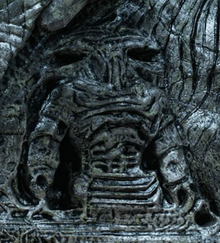
Nmidium as it appears on Alduin's Wall.
Tiber Septim was always fascinated by the Dwarves. After their victory in Morrowind he ordered Zurin Arctus to research the Numidium, the grand artifact of the Dwarves Tiber received from Morrowind. In doing so, Arctus stumbles upon some of the stories of the war at Red Mountain. He discovers the reason the Numidium was made and some of its potential. Most importantly, he learns Ysmir's place in that war of long ago. Arctus believed he could activate the artifact, but he was working from incomplete plans, thinking it was the heart of Lorkhan's body that was needed to power the Numidium.[11]
While Arctus reported about his discovery, the prophecy from the Greybeards finally became clear to Tiber Septim. The Numidium was all he needed to conquer the world. It was his destiny to possess it. The heart of Lorkhan was lost to their cause, but there was another source who could make the Numidium work, Ysmir, the avatar of Lorkhan or Shor.[11] The Emperor contacted Ysmir, saying he was right all along about Morrowind. They should slay the Tribunal, but regroup in order to make a plan beforehand.
Ysmir arrived, but he was ambushed by Imperial guards. As he fights, Zurin Arctus used a soulgem, the Mantella, on him. With his last breath, Ysmir's Heart tears a hole through the Battlemage's chest. With everyone dead, Ysmir has gone to ash for the last time. Tiber Septim walked in to take the soulgem. When the Elder Council arrived, he told them about the second attempt on his life, this time by his trusted battlemage, Zurin Arctus, who was attempting a coup. He had the dead guards celebrated as heroes. Following this event, Tiber warned Cyrodiil about the dangers within, but he says that he has a solution to the dangers without. The Numidium, while not the god Tiber Septim and the Dwarves hoped for, could be activated by Ysmir's soul whom was not unlike Lorkhan after all, which helped Tiber conquer Tamriel.[11] But Ysmir wasn't dead as Tiber thought. In the struggle with Arctus in which both were killed, his spirit left the ashes of his fallen body and took possession of the body of Arctus. He lived on as the Underking.
Underking
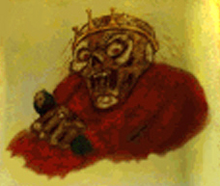
The Underking.
The Underking would proceed to cause problems for Septim for the remainder of his rule. His first major act was the destruction of the Numidium itself. By this time, according to some sources, Septim had been abusing the power of the Numidium against harmless, politically neutral parties. The Underking took offense at this, and smashed the golem to pieces, with the Totem being lost at the bottom of Illiac Bay,[11] and the Mantella being sent to another plane of Aetherius for safe keeping. Because of this the body of the joined spirits became undead.
Tiber Septim was succeeded by his grandson, Pelagius I. Pelagius was just not of the same caliber. In truth, he was a little nervous with all these provinces. Then an adviser shows up. The Underking claims to have been a friend of Tiber Septim, and that he was sent to help Pelagius run the Empire.[11]
Plaque
A plaque in Windhelm, located outside the Palace of the Kings, is dedicated to Wulfharth. Wulfharth's plaque reads:
♦
WULFHARTH
OF ATMORA
REIGNED 1E 480 ― 533
Ysmir, Shor's Tongue, Dragon of the
North and noble champion who
defeated the Direnni and cleaned
Skyrim of the Alessian heresy.
Trivia
- Jarl Balgruuf the Greater believes Wulfharth to have been Dragonborn; when asked, "What's it mean to be Dragonborn?" he may reply, "Wulfharth was Dragonborn. Talos, too - the founder of the Empire, back in the good old days."
References
- ↑ 1.0 1.1 1.2 1.3 Warp in the West
- ↑ 2.0 2.1 2.2 2.3 2.4 2.5 2.6 2.7 Five Songs of King Wulfharth
- ↑ 3.0 3.1 3.2 3.3 3.4 The Arcturian Heresy
- ↑ Wulfharth's plaque outside the Palace of the Kings
- ↑ 5.0 5.1 Rislav the Righteous
- ↑ A History of Daggerfall
- ↑ The Real Nerevar
- ↑ The War of the First Council
- ↑ Cite error: Invalid
<ref>tag; no text was provided for refs named:1 - ↑ Jorunn the Skald-King
- ↑ 11.00 11.01 11.02 11.03 11.04 11.05 11.06 11.07 11.08 11.09 11.10 11.11 11.12 The Arcturian Heresy
